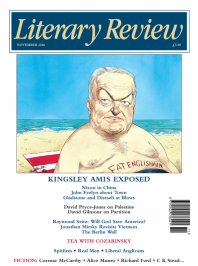Paul Johnson
A Dance With the Devil
Seize the Hour: When Nixon Met Mao
By Margaret MacMillan
John Murray 384pp £25
Summit conferences between heads of state or government are now so common they attract little attention. Nor, as a rule, do they serve much purpose. The prototype – Henry VIII’s meeting with François I of France on the Field of the Cloth of Gold, with its costly splendour – merely intensified the rivalry of the two gamecock monarchs. The Congress at Vienna (1814–15), by contrast, achieved much, settling Europe for nearly a century. But its counterpart at Versailles (1918–19) failed – mainly because the Germans were not part of it, merely the angry recipients of its verdicts. Churchill, to his dying day, believed in summits, and held several during the war, including the disastrous meeting at Yalta where Roosevelt let him down and Eastern Europe was handed over to Russia for forty-five years. There was no peacemaking summit at the end of the Second World War and no comprehensive treaty: events simply took their course, and the settlement really came in 1989 when the Soviet Union collapsed.
There was no general settlement in the Far East either, though the American occupation and democratisation of Japan must be reckoned a success for General MacArthur and his country, a striking example of the way great personalities determine many historical processes. In China, however, events also took their course, with

Sign Up to our newsletter
Receive free articles, highlights from the archive, news, details of prizes, and much more.@Lit_Review
Follow Literary Review on Twitter
Twitter Feed
In the 1830s, the Baltic city of Königsberg was scandalised by a lascivious pastor, accused of encouraging such extreme sexual acts that two young congregants died from arousal.
John Banville looks at 19th-century Germany’s answer to the hot priest.
John Banville - Fall from Grace
John Banville: Fall from Grace - A Scandal in Königsberg, 1835–1842 by Christopher Clark
literaryreview.co.uk
A compelling story of a car crash and a family holiday set amidst omnipresent technological development. In this month's @Lit_Review I reviewed @bruceholsinger latest novel Culpability @EuropaEditions
Oscar Tapper - Dead Ahead
Oscar Tapper: Dead Ahead - Culpability by Bruce Holsinger
literaryreview.co.uk
Delighted by Ian Ellison’s @Lit_Review review of The Glass Mountain. “Gaskill’s painstaking efforts reveal some of the troubled person. In this rich, engrossing book he succeeds in his aim of writing ‘a story that in good conscience feels true’.”
https://literaryreview.co.uk/prisoners-progress